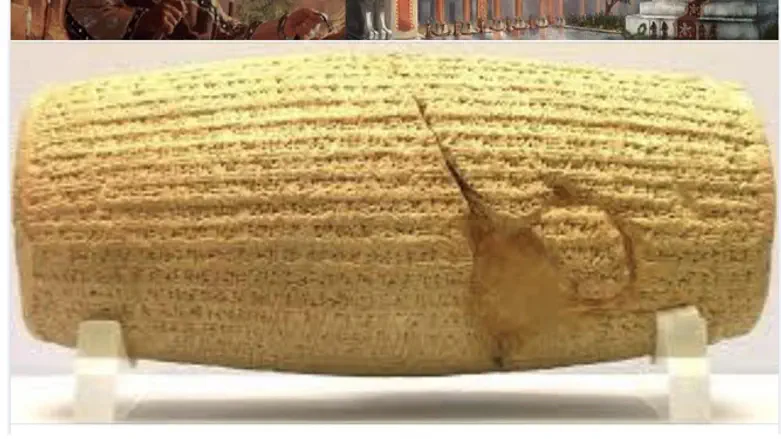
historical figure goes back to the landmark action of King Cyrus the Great of Persia. The
writer of the human rights charter, freed the “enslaved” Jews in Babylon and helped them
financially and by any means available at his deposal go to their Jerusalem, build their
temple, lead a peaceful life and worship their God without harming others instead of forcing them
to become Zoroastrian.
of the world. In order to get a better picture of how the events ensued, we need to
briefly address Persia’s history and unravel some of its perplexing names and origins.
giving rise to the name Iran. Cyrus the Great (Cyrus II), an Achaemenian King, founded the
Persian Empire in the sixth century BCE by the unification of the two Aryan tribes, the
Medes and the Persians. In that medieval era, Persia controlled an empire that stretched
from Europe’s Balkan Peninsula in the West to India’s Indus Valley in the East. It was the
largest empire the world has ever known to that point.
existence, diversity has always been its strength. These are the people who have given Iran its enduring strength and continuity throughout the ages. Those natives include Persians, Azaris, Kurds, Balochis, Turkmen, Gilakis, Mazandaranis, Lurs and more. For millennia, these Iranian patriots have all pledged their allegiance to Iran as an idea and a country whose lofty culture and beauty they all have shaped and contributed to.
Iranians are proud spiritual descendants of King Cyrus the Great, the author of the first
charter of human rights. Some of Cyrus’ children live in the patch of land called Iran. The
overwhelming majority—free humans with humane beliefs—live in every country, city, and
village of the earth. These world-wide people, one and all, irrespective of nationality, color,
or creed are Iranians because they all adhere to the Cyrus Charter, they practice and
defend its lofty tenets, and, transfer this precious treasure to the next
generation.
renew our resolve and do all we must in our power to rescue Iran from the suffocating
quagmire that has stifled our people, and so return our nation to its rightful historic place: A
place in the vanguard of a civilized world where justice and liberty rule supreme for the
entirety of humanity.
Cyrus the Great proclaimed more than 2500 years ago: “Today, I announce that everyone is free to choose a religion. People are free to live in all regions and take up a job provided that they never violate other’s rights.” Cyrus the Great declared himself not as a conqueror, but a liberator and the rightful successor to the crown.
The Book of Ezrra, 1:
1 In the first year of Cyrus king of Persia, in order to fulfill the word of the Lord spoken by Jeremiah, the Lord moved the heart of Cyrus king of Persia to make a proclamation throughout his realm and also to put it in writing:
2 “This is what Cyrus king of Persia says:
“‘The Lord, the God of heaven, has given me all the kingdoms of the earth and he has appointed me to build a temple for him at Jerusalem in Judah. 3 Any of his people among you may go up to Jerusalem in Judah and build the temple of the Lord, the God of Israel, the God who is in Jerusalem, and may their God be with them. 4 And in any locality where survivors may now be living, the people are to provide them with silver and gold, with goods and livestock, and with freewill offerings for the temple of God in Jerusalem.’”
5 Then the family heads of Judah and Benjamin, and the priests and Levites—everyone whose heart God had moved—prepared to go up and build the house of the Lord in Jerusalem. 6 All their neighbors assisted them with articles of silver and gold, with goods and livestock, and with valuable gifts, in addition to all the freewill offerings.
7 Moreover, King Cyrus brought out the articles belonging to the temple of the Lord, which Nebuchadnezzar had carried away from Jerusalem and had placed in the temple of his god.[a] 8 Cyrus king of Persia had them brought by Mithredath the treasurer, who counted them out to Sheshbazzar the prince of Judah.
9 This was the inventory:
gold dishes30
silver dishes1,000
silver pans[b]29
10 gold bowls30
matching silver bowls410
other articles1,000
11 In all, there were 5,400 articles of gold and of silver. Sheshbazzar brought all these along with the exiles when they came up from Babylon to Jerusalem.
 Amil Imani is an Iranian-American writer, satirist, novelist, public speaker, political analyst, foreign policy, National & Homeland Security, Intelligence & Counterterrorism who has been writing and speaking out about the danger of radical Islam both in America and internationally. He has become a formidable voice in the United States against the danger of global jihad and Islamization of America. Amil maintains a website at www.amilimani.com. Imani is the author of Obama Meets Ahmadinejad and Operation Persian Gulf and is currently working on his third and fourth book. He is 2010 honoree of EMET: “The Speaker of the Truth Award” at the Capitol Hill.
Amil Imani is an Iranian-American writer, satirist, novelist, public speaker, political analyst, foreign policy, National & Homeland Security, Intelligence & Counterterrorism who has been writing and speaking out about the danger of radical Islam both in America and internationally. He has become a formidable voice in the United States against the danger of global jihad and Islamization of America. Amil maintains a website at www.amilimani.com. Imani is the author of Obama Meets Ahmadinejad and Operation Persian Gulf and is currently working on his third and fourth book. He is 2010 honoree of EMET: “The Speaker of the Truth Award” at the Capitol Hill.